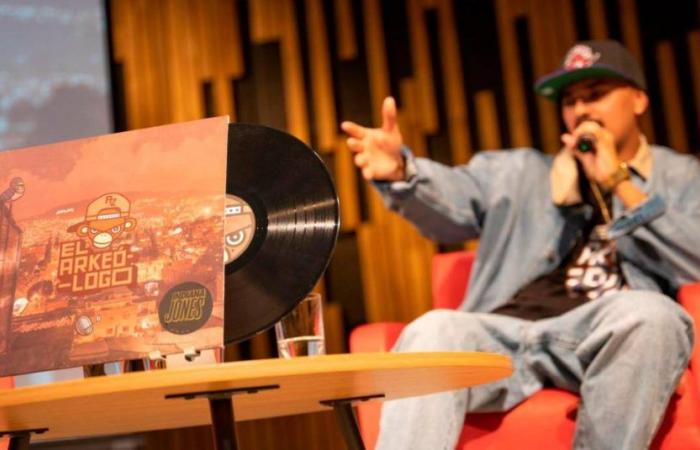To celebrate the fourth anniversary of Indiana Jones, his first instrumental album, the Arkeologist (as Gambeta calls himself in his role as beat maker and producer), held a conversation open to the public to talk about the process of the album, his role as beat maker, his influences, in short, to share with people so much of what he has learned in these years.
We recommend you read: The map of hip hop in Medellín
Because the Archaeologist began to do beats for necessity. Since it started Alcolirykoz He knew how he wanted to sound, and he always came to the studios with ideas, but no producer was able to do exactly what he imagined. So he had no choice but to learn, and he had to start from scratch, in his friends’ houses, because he didn’t even have a computer, and so, little by little, that need that was really an obsession to sound the way he wanted, led him to become one of the best beat makers from the country.
That’s why we compiled some of the lessons she left in this talk—which this journalist moderated—; It is a conversation, it is a master class.
1. Ingenuity and creativity above all
“Technology is made to make things easier and easier, but there will never be a machine that has ingenuity or creativity… I can give you a samples and they give it to me and we are going to do different things (…) What makes a beat maker What stands out is the ingenuity, the way it is executed.”
2. References
“There are many references, the ones that people may know the most always come to mind, but it is impossible for this not to be the case. There are guys who have to be there: Dj Premier, Pete Rock, J Dilla, Easy Mo Bee, Lewis Parker, Eric Sermon… Actually there are many, but I think there are the people who made almost the rap that one more listened.”
3. Develop a style
“In any art, having a style or several is the most difficult, and it is only achieved over the years. When you start, it inevitably sounds like what you admire most, always, even if you think you are inventing water, but when you become aware of your environment, of who you are and you are honest with your project and you are ambitious, you “find a style.”
4. Sample
“When I found the samples original from Another long song I froze on the part I used. It’s a… I don’t know, three minute song, and you play it in its entirety, and you’re caught off guard, and that part comes and there’s something that ties you in, it’s something very powerful for me. I had to brake, cut it, I left it in a loop and I wrote the lyrics without having batteries or anything set up. It’s very invasive, like it steals it from you in a second. I think he had the sadness that he wanted people to feel (…) It’s charro, because the sound cannot be seen, but in reality it is as if it could be seen, as if it were drawing things, that’s how I listen all the time when I go to sample something, as if he saw the future.”
5. Beats to rap vs beats no rap
“The beats, when they are only instrumental, they can be more invasive. He beat It can be filled more, it can be invaded more. When someone raps, no, on the contrary, they have to remove elements so that the MC’s voice occupies that space (…) I stayed studying Pete Rock and I was always like at the beginning of the song super full and when the man I was going to rap, everything was leaked.”
6. beat maker vs producer
“He beat maker is the one who is strictly dedicated to doing beats. The producer covers many more things, among them is thinking about the complete album, curating the beatsbeing in a studio recording and having the head, the ear and the field to even say ‘seem, I would repeat that take’ or ‘that beat “It doesn’t look good on you, that’s not your concern…’ The producer takes everything into account.”
7. Listen to others
“When we started, and I know that many people still retain that individualism like ‘nobody tells me how to do it’, but it turns out that there are people who earned that place, who have more experience than you and when those people put in hand, you feel confident that they are conducting, it is like when in an orchestra they hired a cucho to make the arrangements and conduct everything… That does not mean that you are worthless as a trumpet player, but that man He has the aim for this to go in one direction. I have always said it, the perfect mix will always be that the old school and the new school go together.”
If you want to know more about what The Archaeologist said, go here.


